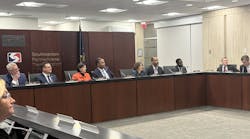SEPTA, WMATA balance operating and capital fiscal year 2026 budgets in different ways
The Southeastern Pennsylvania Transportation Authority (SEPTA) has released its proposed operating and capital budgets for fiscal year 2026, which features massive service cuts and an increase in fares, while the Washington Metropolitan Area Transit Authority’s (WMATA) fiscal year 2026 budgets have been approved while increasing services on both its bus and rail network and not increasing fares.
SEPTA’s massive cuts
The budget proposal SEPTA released on April 10 would require 45 percent in service cuts – coupled with major fare increases, workforce reductions and a 9:00 p.m. curfew for all rail services – to address a massive structural budget deficit during the new fiscal year that starts July 1. SEPTA notes the release of the budget comes amid critical negotiations in Harrisburg, Pa., on a statewide transit funding plan introduced in February by Pennsylvania Gov. Josh Shapiro that would prevent the measures from taking effect.
According to the agency, customers would see service cuts, including the elimination of dozens of bus routes and significant reductions in trips on all rail services, beginning with the launch of fall schedules on Aug. 24. A fare increase averaging 21.5 percent for all riders would go into effect on Sept. 1, followed by the elimination of five Regional Rail lines and the 9:00 p.m. rail curfew on Jan. 1, 2026. A total of 50 bus routes would be shut down between Aug. 24 and Jan. 1, 2026.
“These cuts to SEPTA’s service – which would hurt our economy and make it harder for hundreds of thousands of Pennsylvanians to get to work, school and wherever else they need to go – are completely avoidable,” Shapiro said. “For two years in a row, I have proposed a commonsense plan to support mass transit all across the commonwealth and last December, I flexed funding to give the legislature more time to come to the table. The state House has passed my proposal three times and plans to do so again next month – it is now squarely on the state Senate to come to the table and pass more funding for mass transit that their own constituents rely on.”
Beyond regular riders, SEPTA notes that those traveling to games at the Sports Complex and other special events would have to navigate the 9:00 p.m. curfew for rail services, along with other restrictions. SEPTA would be forced to cease providing additional service to special events, including plans to support the World Cup, the U.S.’s 250th anniversary celebrations and other 2026 events.
SEPTA says the effects on businesses – including the region’s healthcare systems that rely on the agency to transport employees and patients – would be immediate and far reaching.
“SEPTA would go from being the economic driver of this city and region to its limiter,” said SEPTA Board Chair Kenneth E. Lawrence Jr. “We are grateful for Gov. Shapiro’s proposal and for the continued efforts of legislators from our city and region. Now, we all need to hear from the public. Even if you don’t ride, deep service cuts would impact you – whether it is from increased congestion on area roadways, declining property values or less revenue for local businesses as SEPTA purchases significantly fewer supplies and materials.”
SEPTA says it is facing this budget gap due to a combination of the end of federal COVID-19 relief funding and increases in the day-to-day costs of providing service to customers. According to the agency, the federal COVID-19 funds helped SEPTA maintain service for essential workers through the pandemic. While ridership has recovered over the last few years, SEPTA notes it has had to take on additional costs to address emerging challenges, particularly crime, disorder and the vulnerable population. The authority has also had to grapple with the impact of inflation on everyday necessities such as fuel, power and supplies.
SEPTA notes it has been responding to the funding crisis by cutting costs and generating new revenue. Aggressive austerity measures, including a freeze on management pay and cuts to third-party consultants, have resulted in savings of $30 million. Other measures, including a 7.5 percent fare increase and the resumption of paid parking at Regional Rail lots, are generating new revenue. Together, the efforts have helped reduce the agency’s budget deficit to a forecasted $213 million for fiscal year 2026.
“We know how critical service is to our customers and the region, and we have done everything possible to avoid the drastic measures that are proposed in this budget,” said SEPTA Interim General Manager Scott A. Sauer. “We have made significant progress in cutting costs, growing ridership, improving reliability and delivering on safety and security enhancements. All of that is at risk if we are forced to start dismantling the system.”
SEPTA notes Gov. Shapiro provided riders with a lifeline last fall when he flexed federal highway funds to fill the current year’s budget gap. The agency notes that move was a one-time measure, and that by law, SEPTA is required to pass a balanced operating budget prior to the start of the new fiscal year on July 1, and the authority’s only options to close such a massive structural deficit are to raise fares and cut costs by eliminating services and reducing the size of its workforce.
The agency also released its capital budget proposal for the coming year. SEPTA notes funding constraints and inflation are impacting its ability to move forward on some improvement efforts. Under the proposal, the agency would close the funding gap by deferring dozens of projects and other capital-funded initiatives, which will delay the achievement of previous commitments for key priorities like station accessibility.
SEPTA will hold four public hearings about the proposed fiscal year 2026 operating budget at SEPTA Headquarters on May 19 and May 20. The capital budget hearings will be held on May 21. The agency will review all public feedback before the operating and capital budget proposals are sent to the SEPTA Board for a vote on June 26.
WMATA approves 2025 capital and operating budgets
The WMATA Board of Directors approved a $4.96 billion capital and operating budget. The approved budget continues to fund WMATA at levels where service is safe, frequent and reliable without raising fares. In recent years, WMATA has seen increased ridership thanks to those tenets and expects that trend to continue, with additional Metrorail service and a revamped bus network coming in June.
“We’ve now accomplished 48 months of ridership growth with continued increases to service and continuous improvements for customers,” said WMATA General Manager and CEO Randy Clarke. “I want to thank our board of directors for their support of this budget and our jurisdictional partners in Maryland, Virginia and Washington, D.C. [WMATA] could not move the region without their collaboration and leadership.”
WMATA says it has also become a leaner, more efficient organization by identifying $20 million in operational savings from bus scheduling, rail service, fleet management and administrative savings.
“The board commends the [WMATA] senior team and staff for identifying opportunities to streamline and improve operations and achieve cost efficiencies across both service and administrative areas,” said WMATA Board Chair Valerie Santos. “Even during the significant budget challenges of recent years, [WMATA’s] unwavering commitment to provide efficient, accessible, safe and reliable excellent service guides the team’s work.”
Operational budget
WMATA says the fiscal year 2026 Operating Budget is $2.5 billion and supports the launch of the Better Bus Network Redesign in year one, which introduces 11 new routes to the Frequent Service Network, expands midday, evening and weekend service and enhances connectivity to transit stations, employment centers and key destinations.
Metrorail changes that will be effective on June 22 include:
- Longer weekend hours: The rail system will open one hour earlier at 6:00 a.m. on Saturdays and Sundays. The system will close one hour later on Fridays and Saturdays at 2 a.m.
- Split Silver Line service: The Silver Line will run in two service patterns, with half of trains operating between Ashburn and Downtown Largo, and half operating between Ashburn and New Carrollton.
- More Silver Line service during peak times: Additional trains will operate during peak rush hour on weekdays, with trains running from Wiehle-Reston East to New Carrollton in the morning and from Stadium-Armory to Wiehle-Reston East in the afternoon.
- More Red Line service during peak times: Additional Red Line trains will be scheduled to run at least four minutes (up from every five minutes) during the busiest portions of weekday rush hours.
The extension of the Yellow Line, with half of WMATA trains operating between Huntington and Greenbelt and half operating between Huntington and Mount Vernon Square, will begin in December.
Better Bus Network changes will be effective on June 29. The Better Bus Network is a redesign of the entire Metrobus network, its first redesign in 50 years. According to WMATA, every bus route will change. Changes may include streamlining of the route, more frequent service on some routes and renaming of every route for easier navigation. According to the agency, the Better Bus Network will create new connections to transit stations and expand midday, evening and weekend service.
Capital budget
WMATA notes the $2.37 billion capital budget invests in the system to modernize and provide safe, efficient and reliable service for customers, employees and the region by addressing repair needs and replacing aging equipment. According to WMATA, approximately $200 million of capital expenditures previously planned for fiscal year 2026 and fiscal year 2027 are deferred or delayed beyond fiscal year 2027 in the updated capital budget recommendation. Ongoing projects and programs with updated six-year expenditure schedules include:
- Digital customer and information displays
- Bus fleet acquisition
- Fare collection modernization
- Rail automation
- Union Station First Street entrance improvements
- Rail vehicle scheduled maintenance program
WMATA’s fiscal year 2026 runs from July 1, 2025, to June 30, 2026.

Brandon Lewis | Associate Editor
Brandon Lewis is a recent graduate of Kent State University with a bachelor’s degree in journalism. Lewis is a former freelance editorial assistant at Vehicle Service Pros in Endeavor Business Media’s Vehicle Repair Group. Lewis brings his knowledge of web managing, copyediting and SEO practices to Mass Transit Magazine as an associate editor. He is also a co-host of the Infrastructure Technology Podcast.







